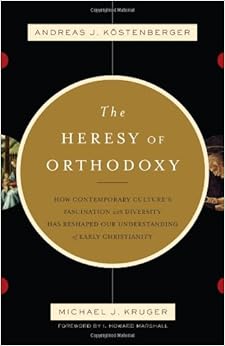Wikipedia ascribes to the Bauer-Ehrman hypthesis with respect to early Christianity which has been soundly refuted and so are making historically false assertions such as most early Christians ascribed to heresy. It's not true.
Orthodox Christianity was organized early (in the AD 40s and 50s) with a core belief system that an ecclesiastical organization subsequently built on. The church's foundational organizing principles and orthodox epistemology were already in place in the first century.
Prior to Constantine's Edict of Milan (AD 313) that mandated religious toleration throughout the Roman Empire, adherents of orthodoxy had no official means or power to relegate heretics to a marginal role yet with respect to the Arian controversy of 318 AD there is no significant mention of any Gnostic sect during this controversy for prior to Constantine's mandate, the orthodox were able decisively to refute these heretical movements. The heretics were nowhere near as numerous and pervasive as Bauer-Ehrman, Wikipedia, liberal postmodern revisionist authors, etc... contend.
Without an official governing body in place, the only way that the orthodox could have "won" prior to Constantine was through the force of sheer numbers which was, in fact, the case. And it's a good thing too because if heretics actually had been the majority, orthodoxy would have been overturned. But they weren't and it wasn't. It's not so amazing when you understand history as it was rather than as modern and post modern liberal revisionists misrepresent it to be.
Read 'The Heresy of Orthodoxy' by Dr. Andreas J. Köstenberger and Dr. Michael J. Kruger as a suggested starting point:

Orthodox Christianity was organized early (in the AD 40s and 50s) with a core belief system that an ecclesiastical organization subsequently built on. The church's foundational organizing principles and orthodox epistemology were already in place in the first century.
Prior to Constantine's Edict of Milan (AD 313) that mandated religious toleration throughout the Roman Empire, adherents of orthodoxy had no official means or power to relegate heretics to a marginal role yet with respect to the Arian controversy of 318 AD there is no significant mention of any Gnostic sect during this controversy for prior to Constantine's mandate, the orthodox were able decisively to refute these heretical movements. The heretics were nowhere near as numerous and pervasive as Bauer-Ehrman, Wikipedia, liberal postmodern revisionist authors, etc... contend.
Without an official governing body in place, the only way that the orthodox could have "won" prior to Constantine was through the force of sheer numbers which was, in fact, the case. And it's a good thing too because if heretics actually had been the majority, orthodoxy would have been overturned. But they weren't and it wasn't. It's not so amazing when you understand history as it was rather than as modern and post modern liberal revisionists misrepresent it to be.
Read 'The Heresy of Orthodoxy' by Dr. Andreas J. Köstenberger and Dr. Michael J. Kruger as a suggested starting point:

Now, I stated that there are scholars who put it at 70-80%, but if they are wrong they are not off that it was a majority. Even the Coptics teach about this period, because it was during this period their church officially severed ties with the Roman government, though not the hierarchy of the Church, that started in the 600s and became an official split during the 700s due to being cut off suddenly from the Christian world.
